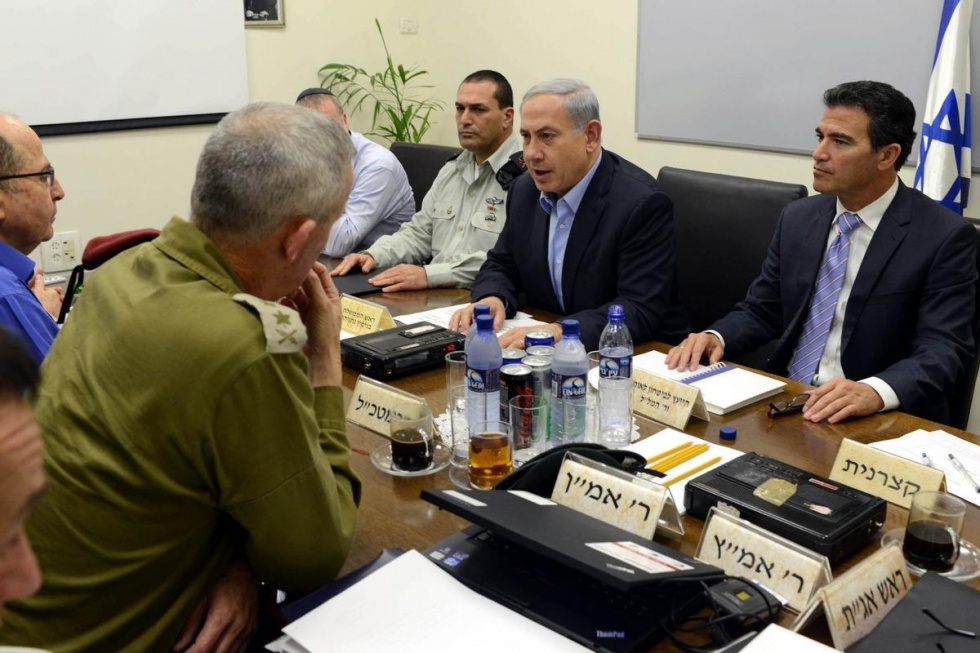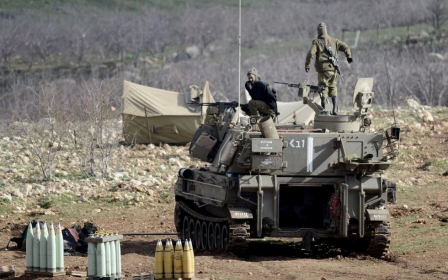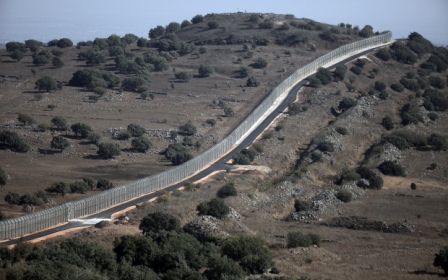Neither Hezbollah nor Israel likely to want war, say analysts

It was a day that saw Israel and Hezbollah exchange lethal strikes across a border that, until recently, has been calm for years.
Yet despite heightened rhetoric, the measured military responses on both sides suggest that elevated tensions have likely reached their apex - largely, say analysts, because neither side wants a repeat of the 2006 war.
Since the 1973 war, the area where Israel, Lebanon and Syria meet has been largely uneventful. But recently, the Syrian civil war, in which Hezbollah is fighting alongside the forces of Syrian President Bashar al-Assad, has drawn spillover attacks into the border region.
Wednesday’s clashes began when Hezbollah fired a rocket at an Israeli military convoy in the Israel-occupied Shebaa Farms, killing two Israeli soldiers. An hour later, mortars launched from Lebanon hit an Israeli military position in the foothills of Mount Hermon.
The attack was thought to be in retribution for an attack on 18 January, widely attributed to Israel, that killed an Iranian Revolutionary Guard general and six Hezbollah fighters, including Jihad Mughniyeh, the son of late Hezbollah icon Imad Mughniyeh.
Israel responded with aerial and ground attacks into what Israeli military officials said were Hezbollah operation positions in Lebanon. During these strikes, a Spanish UN peacekeeper, part of the 10,000 strong UN Force in Lebanon (UNIFIL), was killed near Shebaa Farms, said Roman Oyarzum Marchesi, Spain’s ambassador to the UN.
Following the attacks, politicians and leaders on both sides took to the airwaves to threaten further action.
Israeli Prime Minister Benjamin Netanyahu, in the middle of an election campaign, promised that those behind the attack that killed two Israeli soldiers would “pay the full price”.
Thousands of miles away in a meeting in China with his counterpart, Israeli Foreign Minister Avigdor Lieberman said that Israel should respond to the attack in a “very harsh and disproportionate manner, as China or the US would respond to similar incidents”.
Tzipi Livni, co-chair of the Zionist Camp coalition, which is currently beating Netanyahu’s Likud party in national polls, stated that Israel would respond "harshly".
"Hezbollah is part of the extreme Islamist axis in the Middle East and it must be dealt with by force, and the [Israeli army] and its soldiers know how to do this precisely and responsibly,” she said.
Palestinian response
Meanwhile, in the Gaza Strip, both Hamas and Islamic Jihad praised Hezbollah’s attack, saying the Lebanese group had a right to retaliate against Israel.
“The occupation soldiers are paying the price in the north - the same price they have paid on the edges of Gaza due to the stupidity and arrogance of Netanyahu,” said Sami Abu-Zuhri, a Hamas spokesman.
The Al-Quds Brigades, the military wing of Islamic Jihad, described Hezbollah’s actions as “heroic”.
“We welcome the heroic Shebaa attack, and we shall hope from victory to another,” the group said in a brief statement.
Ahmed al-Mudallal, a senior Islamic Jihad leader, said the attack “can be built upon” and stressed that it “will be the basis of a new stage in fighting [the Israeli] occupation, and the start of a new victory."
“Today there is strategic resistance that Arabs and Muslims can rely on, which does not know humiliation and disgrace,” he added.
The Marxist-Leninist Popular Front for the Liberation of Palestine (PFLP) also released a statement praising the attack.
"The Popular Front for the Liberation of Palestine welcomed the heroic operation that Hezbollah carried out against the Israeli enemy's army patrols in southern Lebanon," it read and also called for a "united front" of Palestinian and Arab forces in the region to fight against Israel.
Wary to launch major conflict
Despite the heightened rhetoric, analysts suggest that both Hezbollah and Israel would be wary of rushing into another conflict.
“We’ve just been in this situation in Gaza in the summer and I don’t think the Israeli army wants into Hezbollah," said Yossi Mekelberg, an associate fellow at Chatham House.
"Hezbollah has its own pressures in Lebanon not to do this because of 2006. Israel remembers both 2006 and what happened in Gaza this summer. They’re not particularly interested in being in a shelter for a couple of weeks or god knows how long and the Israeli army doesn’t want to be caught in the middle of this.”
However, he cautioned that tensions were still high. “The fact that neither of them want to escalate doesn’t mean it won’t happen,” he told Middle East Eye.
Hilal Khashan, a professor at the American University of Beirut told The Washington Post that Hezbollah is "stretched thin" due to its involvement in Syria.
“Even if it were not in Syria, that doesn’t mean that Hezbollah would want a major escalation with Israel,” Khashan said.
“The Israeli shelling in the south isn’t terribly intense,” he added. “So I don’t think this will lead to a major conflagration.”
Questionable timing
Coinciding with a heated Israeli election campaign, the timing of the violence raised questions of whether heightened politicking could mean that more "hawkish" elements of Israel's political scene could push the situation towards escalation.
“This side of the political map will like to show their credentials and I’m afraid they will be more adventurous in this kind of situation and hence the risk of escalation," Meckelberg said. "Likud is not faring well in public opinion polls; Lieberman because of a lot of other issues is losing height – there is a real danger there."
Dimi Reider, an associate fellow at the European Council on Foreign Relations, told MEE that he thought it was unlikely Netanyahu would try to gain political capital from the killings. “If Netanyahu is lucky, people will have forgotten about this by the time the election has taken place,” he said.
Reider suggested that the accepted wisdom that conflict usually results in a boost for right-wing or incumbent candidates is misfounded, and Netanyahu realises this.
"Operation Cast Lead didn’t help Kadima beat Netanyahu in 2009," he said, referring to Israel's military operation in Gaza in 2008-09, launched by Kadima leader and then-Prime Minister Ehud Olmert.
"Operation Pillar of Cloud didn’t help Netanyahu get as many seats as he wanted in the 2013 elections. Then after an initial boost in popularity, the last operation in Gaza left him politically damaged.”
Reider also dismissed the notion that Netanyahu intended any provocation of the Syrian government through his language.
“That would seem totally contrary to his entire strategy about Syria," he said. "Israel has been so far the only neighbour of Syria not to be impacted by the conflict, much to his credit. We didn’t get involved in the fighting and we’ve not been affected by the refugee crisis, though that’s a harsh thing to say.”
Lebanon and Israel have fought frequently since the creation of the State of Israel in 1948. Israel occupied southern Lebanon between 1982, when it invaded with the intention of destroying the Palestine Liberation Organisation (PLO) and 2000 when it withdrew, still maintaining control of the Shebaa Farms.
Hezbollah and Israel fought again in 2006, resulting in the deaths of more than 1,200 people.
Mohammed Omer contributed reporting from Gaza City.
Middle East Eye propose une couverture et une analyse indépendantes et incomparables du Moyen-Orient, de l’Afrique du Nord et d’autres régions du monde. Pour en savoir plus sur la reprise de ce contenu et les frais qui s’appliquent, veuillez remplir ce formulaire [en anglais]. Pour en savoir plus sur MEE, cliquez ici [en anglais].



